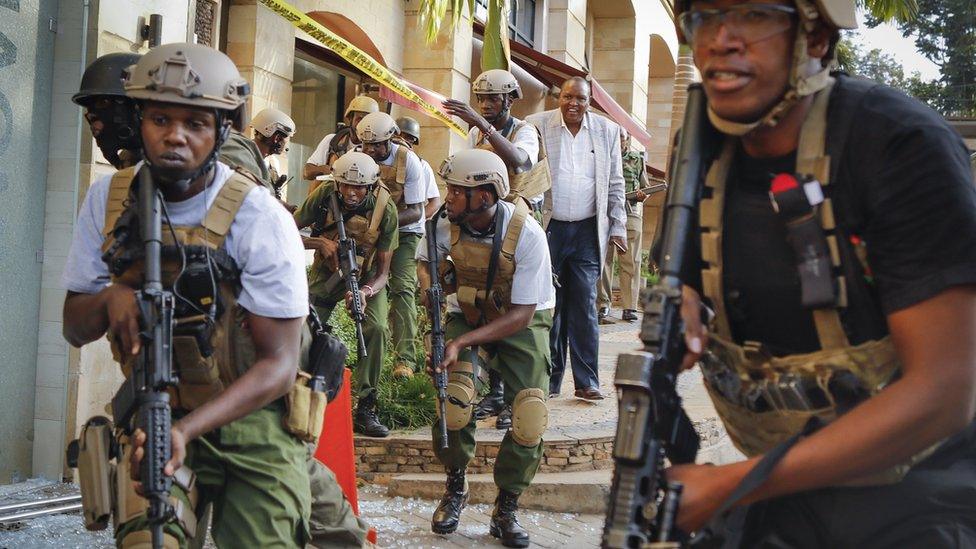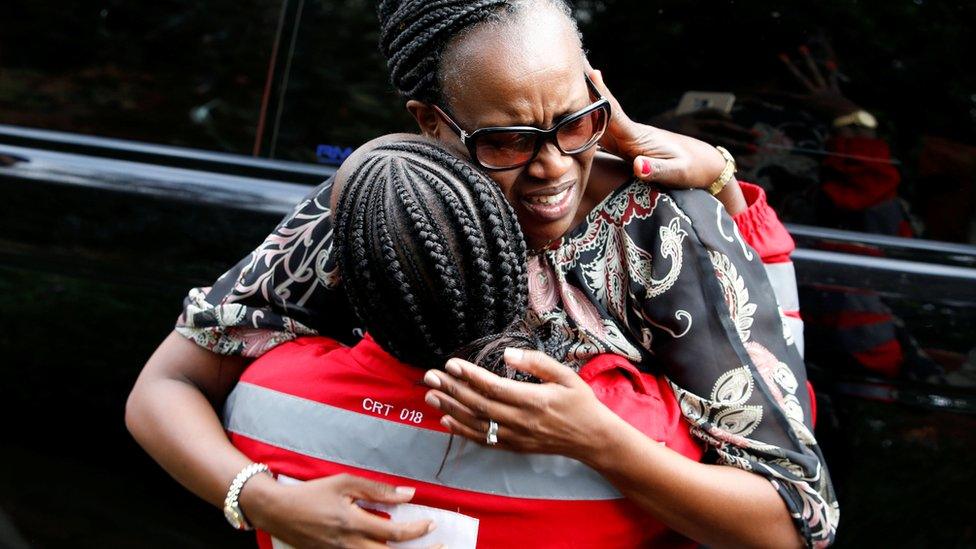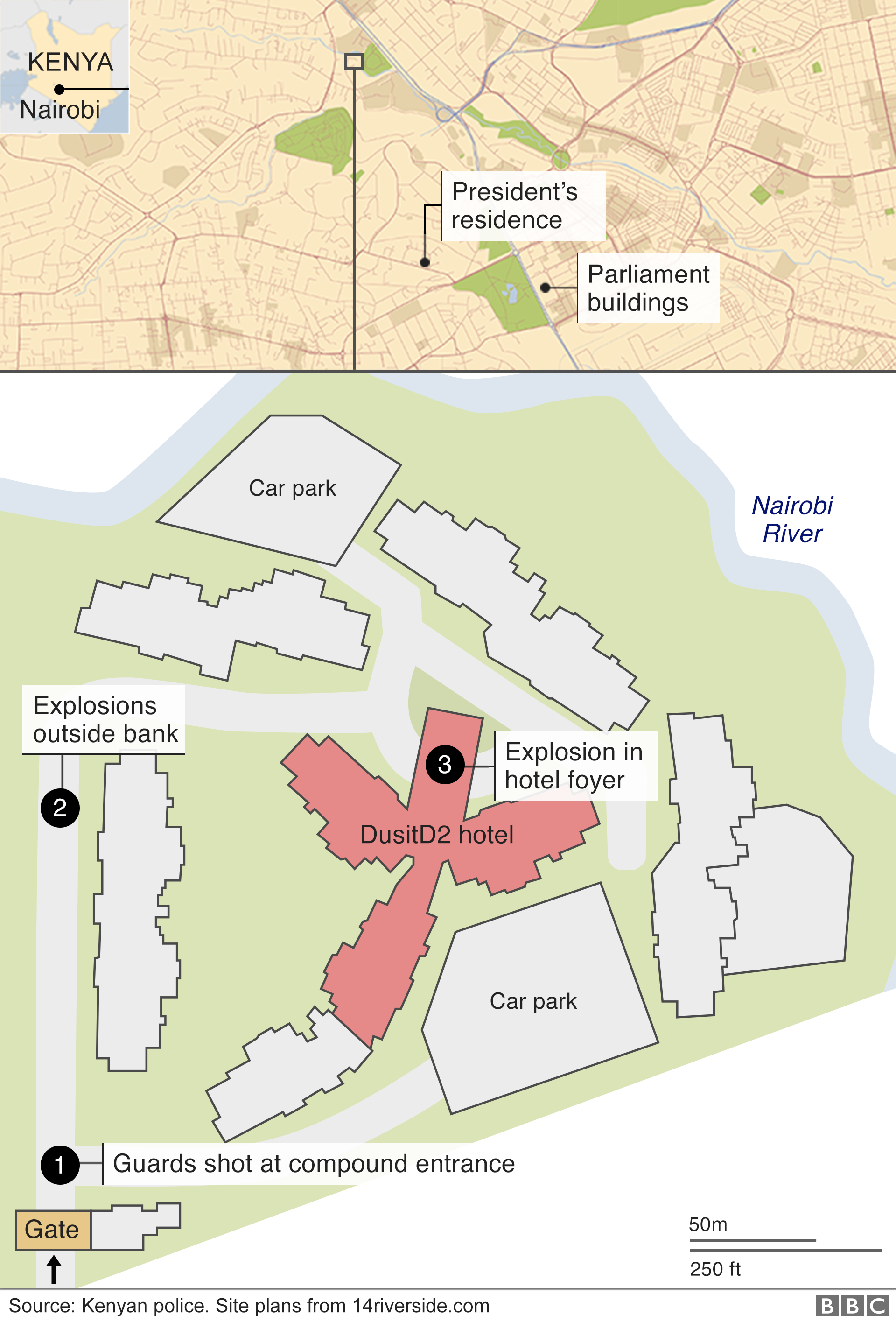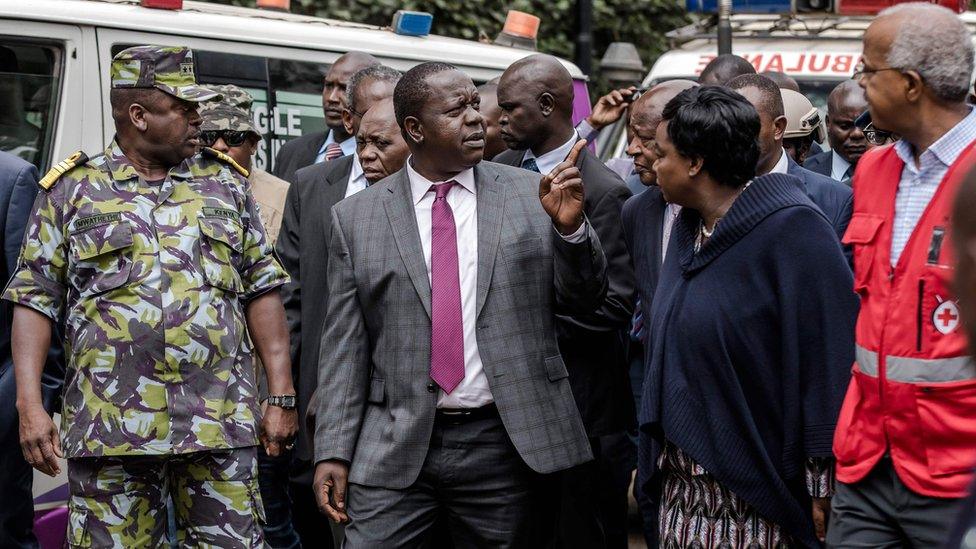Kenya attack: Relief replaces fear after attack
- Published

After 19 hours of terror, gunfire, bloodshed, and inevitable confusion, the siege at an upmarket hotel and business complex in the hills west of Nairobi's central business district ended abruptly on Wednesday morning.
"The security operation… is over and all the terrorists eliminated," Kenya's President Uhuru Kenyatta announced on national television, to widespread public relief.
Throughout the night, cowering groups of civilians - many had spent hours hiding in their offices or in bathrooms - were escorted to safety by security forces. The sporadic bursts of gunfire and the boom of explosions continued well beyond dawn.
"Eight hours and still praying for a rescue hopefully soon," businesswoman Aggie Asiimwe Konde texted from her hiding place overnight, before being rescued three hours later with "over 50 people in my group. No injuries".
"Please help… I am at 14 Riverside Drive… huge bomb then gunshots now I am hiding in toilet," Ronald Ng'eno messaged on social media.
Two hours later he said he was "still hiding… Phone charge almost off… We are still in bathroom gunshots in building, please pray… If I die… please tell my family I love the(m)." He was also rescued early on Wednesday morning.

Read more:

On the crowded street outside the large, upmarket complex, friends and relatives embraced those who emerged, and thanked Kenyan security forces. A fleet of ambulances stood ready to take the wounded to hospital.
"We managed to move slowly… and carefully, as the gunfire was getting closer, then we managed to jump over a small fence," said one man.

An emergency worker comforts a woman at the scene of the attack
At least one British citizen and an American were among the dead. The American victim was named as Jason Spindler. His brother, Jonathan, announced on Twitter that Jason had survived the 9/11 attacks in New York, and "passed away this morning during a terror attack in Nairobi… I am sure he gave them hell!"
Several bodies were photographed slumped at their tables in the Secret Garden restaurant - among the first places that the gunmen targeted on Tuesday afternoon.
'Attackers had visited hotel before'
The attackers - thought to be members of Somalia's militant al-Shabab group - were filmed by a security camera as they walked, in dark camouflage outfits, through a car park and then opened fire.
A guard later reported that he had seen the same group visiting the hotel - presumably to acquaint themselves with the layout - in the days leading up to the attack.
President Kenyatta confirmed that 14 people had been killed and more than 700 rescued.
However, there is speculation that the death toll may rise, as well as a long-standing degree of public scepticism about official figures.


Kenya's security services have faced strong criticism for their handling of past terrorist incidents - in particular the 2013 Westgate Mall attack in which rival agencies were accused of infighting, looting, and lying about key details of the four-day siege.
On Wednesday, President Kenyatta and his interior minister both implied that lessons had been learned.
"I want to commend the quick and effective response by our elite fighting teams for neutralizing all the terrorists. We have dealt with the threat decisively, and shown our enemies and the world that we are ready to deal with any threat to our nation," said Mr Kenyatta.
'Tourists are safe'
Interior Minister Fred Matiangi told journalists outside the compound that the operation demonstrated "how well our security forces are prepared".
On Tuesday evening, the minister had faced criticism for claiming, prematurely, that all the buildings had been secured. He declined to confirm how many attackers had been involved, or killed.

Kenyan Interior Minister Fred Matiangi praised the security forces' response
Kenya's vital but precarious tourism industry has been badly damaged by past terrorist attacks - not least Westgate and the 2015 attack on a university campus in Garissa - and by negative travel advice issued by foreign governments.
This time, President Kenyatta was quick to "assure every Kenyan and foreign visitor" that they were safe.
The latest attack came on the third anniversary of a devastating assault by al-Shabab militants on a Kenyan army post in Somalia in which, it is widely suspected, as many as 180 Kenyan troops were killed.
It is a stark reminder that al-Shabab remains a powerful force, with the capacity to strike at a well-guarded target in a neighbouring country.